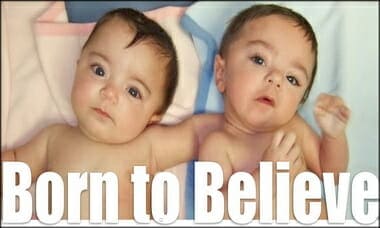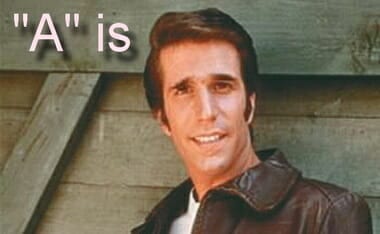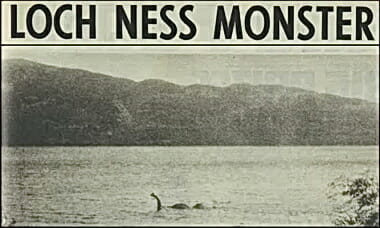I remember the first time that I saw the bus. An old friend of mine had telephoned me out of the blue a few days before, and in a conspiratorial whisper had hissed: “You need to get down to London. There are atheist buses here.”
“Atheist buses?” I replied, bleary-eyed. It was long past midnight “How much have you drunk, Tom?”
“Only four pints,” Tom replied indignantly.
“Well, I’ve always personally thought that the slightly devil-may-care attitude of many London bus drivers to road safety tends to bring people closer to God, rather than drive them away.”
“This bus didn’t try to drive me away; it tried to drive over me. Admittedly, I was lying semi-comatose in the road at the time —”
“I knew it!”
“— at Hammersmith, and the atheist bus almost ran me over.”
“You do realize”, I explained, in the patient tone I reserve for small children and airline check-in agents, “that just because a London bus almost flattens a liberal Anglican lying on a zebra crossing, it doesn’t necessarily mean that Richard Dawkins is resorting to hit-and-run attempts to keep the religious affiliation statistics favourable.”
“I’m used to being nearly run over, I’ve holidayed in France many times,” snapped Tom. “But this was an atheist bus, I tell you.”
“You’re sure about this?”
“Yes! Now come down to London and see. Besides, you owe me a beer from that time when you lost the bet about the Archbishop’s beard.”
And so it was that I found myself, on a rainy July afternoon a few weeks later, standing among a crowd of damp tourists outside Oxford Circus tube station. We watched the traffic as cars, taxis, lorries, and the occasional sodden cyclist trundled past. And then, at last, a bus rounded the corner. A big, red London bus sporting a huge advertisement on the side, which announced in large friendly letters: “There’s Probably No God. Now Stop Worrying and EnjoyYour Life.”
Later, back in the comfort of a nearby pub, I did a little research. It turned out that the bus advertisements had been sponsored by The British Humanist Association along with a group of secular celebrities, including the well-known Oxford atheist Richard Dawkins, and represented, in their words, an attempt to provide a “peaceful and upbeat” message about atheism. The advertisements promoted a website where those who browsed could while away their journey on the number 137 bus to Battersea reading about the joys of life without belief in a god.
The atheist bus is a good place to begin our journey, because it illustrates two reasons why this book exists. First, because the slogan, despite its friendly pink letters, is a perfect example of a really bad argument. An argument so bad, so disastrous, in fact, that one has to wonder what its sponsors were thinking. More on that in a moment. But, second, it illustrates how quickly bad arguments can disseminate, spreading like an infestation ofJapanese knotweed into popular culture. For while many critics — including many atheist critics — were quick to point out the flaws in “There’s Probably No God. Now Stop Worrying and Enjoy Your Life”, it has nevertheless continued to pop up on the sides of buses not just in London but also around the world.
The bus advertisement typifies what’s come to be termed the “New Atheism”, a phrase coined back in 2006 by Wired magazine to describe the group of media-savvy atheists — men such as Richard Dawkins, Sam Harris, Daniel Dennett, and the late Christopher Hitchens — whose books attacking religion in general and Christianity in particular have sold by the truckload. What’s new about the “New Atheism”? As many have pointed out, not so much its arguments, which tend to be old ones, as its tone — which is one of apoplectic anger. Why the anger? Well, I suspect partly because God was supposed to have disappeared a long time ago, as the Great Secular Enlightenment trundled inexorably onward. As far back as 1966, Time magazine could slap a question like “Is God Dead?” on the cover (with the strong implication that the answer was “Yes”). Today, however, religion is alive and well and shows little sign of disappearing. The failure of God to roll over and die on cue has led to the denial, disappointment, and anger that can be seen underpinning much of today’s more popular form of atheism.
And, my word, has the New Atheism become a popular movement Richard Dawkins’s book The God Delusion alone has sold several million copies. Atheism has gained a voice and a confidence, and that’s fine — in the past, it was tough to be an atheist, when most societies were overwhelmingly religious. Recently, however, there’s been a cultural volte-face in many Western countries, with atheism now seen as the default position. Many people assume that atheism is, indeed, the only position for somebody who wishes to be considered educated, sophisticated, urbane, and rational. This is precisely the way the media often treats the issue too: atheism is portrayed as scientific, contemporary, and for those with brains, whereas religion is characterized as stuffy, outmoded, and irrational, something for old ladies or fuddy-duddies.
But there’s a problem. Well, several problems. Chief among them is this: that much of contemporary atheism thrives on poor arguments and cheap sound bites, advancing claims that simply don’t stand up to scrutiny. Like a cheaply made cardigan, they’re full of loose threads that, if tugged firmly, quickly begin to unraveL Let me demonstrate what I mean by returning to that notorious bus advertisement, “There’s Probably No God. Now Stop Worrying and Enjoy Your Life”. Let’s ask a few critical questions about that claim for a moment. What’s wrong with it? Well, one might begin by noting the preachy, condescending, and hectoring tone. I’ve known many atheists over the years whose chief beef with religion has been that they can’t escape it. If it’s not televangelists with perfect teeth, it’s church billboards with dodgy graphic design or giant advertising hoardings warning of hellfire and damnation. “You religious types insist on preaching at us” is the complaint Well, now the boot is very much on the other foot and the New Atheism is zealously evangelistic, not merely content with denying deities but offering health benefits at the same time (No worries! Enjoyment! Good hair!).
But there’s a deeper problem, too. For atheists like Richard Dawkins, God does not exist, right? That, after all, is what the very term “a-theist” means. Of course, there’s a myriad of other things that don’t exist: fairies, unicorns, the Flying Spaghetti Monster, successful England soccer squads. But here’s my question: what’s the connection between the non-existence of something and any effect, emotional or otherwise? There probably aren’t any unicorns, so cheer up. The Flying Spaghetti Monster is just a secular parody, so take heart. There’s no God, so quit worrying. How, precisely, does that work? Somebody once remarked that a nonsensical statement doesn’t become coherent simply because you insert the term “God” into it, so let’s illustrate the problem by rewording the atheist bus slogan for a moment:
- There’s Probably No Loch Ness Monster. So Stop Worrying and Enjoy Your Life.
Imagine, for a moment, that you’re down on your luck. Life has dealt you a series of terrible hands and nothing seems to be going your way. You’ve recently lost your job. Your wife has just left you and taken the kids with her. This very morning, a letter from your bank has arrived, declaring you bankrupt The doctor’s surgery has just rung to inform you that those worrying headaches are actually Creutzfeldt-Jakob disease. Oh, and you’re a Bradford City FC fan. Life really sucks. Have no fear, however. Put all that aside. Fret no more. For there is hope. There is an end to all worries. “There is?” I hear you cry, wiping back the tears. Yes, there is. Because (are you ready for this?) the Loch Ness Monster doesn’t exist. Never mind the fact that you may be jobless, loveless, penniless, and hopeless, doesn’t it warm the cockles of your heart to know that holidaymakers in Scotland can munch their sandwiches by Urquhart Castle and paddle their feet in Loch Ness, safe in the certain knowledge that no monster from the Jurassic era Will rear up from the deep and drag them off to a watery grave. So, are you feeling better now? No, probably not
So the first half of the claim — no God, no worry — fails spectacularly. The second half doesn’t fare much better either: “Enjoy your life.” What could be wrong with that, unless you’re one of those masochistic religious types who prefer guilt to glee? Well, Francis Spufford nails this one perfectly:
I’m sorry — enjoy your life? Enjoy your life? I’m not making some kind of neo-puritan objection to enjoyment Enjoyment is lovely. Enjoyment is great The more enjoyment the better. But enjoyment is one emotion. The only things in the world that are designed to elicit enjoyment and only enjoyment are products, and your life is not a product … To say that life is to be enjoyed (just enjoyed) is like saying that mountains should have only summits, or that all colours should be purple, or that all plays should be by Shakespeare. This really is a bizarre category error.
In other words, there is considerably more to life than just enjoyment Indeed, the full gamut of human emotions spans the alphabet To be fully, authentically human is to have experienced anger, boredom, compassion, delight, expectation, fear, guilt, hope, insecurity, joy, kindness, love, malice, nonchalance, obligation, peace, queasiness, relief, sensuality, thankfulness, uneasiness, vulnerability, wistfulness, yearning, and zealousness. Given all this, why does the atheist bus advertisement zero in on “enjoyment”? Now obviously I’m not privy to the interior mental state of those who penned the slogan, but I do wonder if it’s a symptom of a more general trend in our culture — one that says that the purpose of human life is simply to be happy, to flit merrily from one experience to another in an effervescence of ecstatic enjoyment Product after product is sold to us this way: buy this coffee, take that holiday, wear this shade of lip gloss, and you’ll be successful, popular, and joyful. The atheist bus is simply riding the cultural wave — think like this, it says, and you’ll be happy.
But what if you’re not happy? What if you’re like my earlier example — jobless, friendless, penniless, and hopeless? What if you’re at a point in your life where all is smelling not of roses, but rather suspiciously like a sewage farm on a hot afternoon? Indeed, half the world’s population lives on less than $2.50 a day and that amount is not going to keep you in lattes, lipstick or trips to Lanzarote, which means that, if the advertisers are correct about where enjoyment is located, you’re in trouble, so you’d better pull yourself together. I stress you, second person singular, had better pull yourself together, because, if the atheist bus slogan is right and there is no God, there’s nobody out there who is ultimately going to help with any pulling. You’re alone in a universe that cares as little about you (and your enjoyment) as it does about the fate of the amoeba, the ant or the aardvark. There’s no hope, there’s no justice, and there’s certainly nothing inherently wrong with poverty, incidentally, so quit protesting. Life favours the winners; some get the breaks, and others get the sticky end of the stick. Still others get to make millions selling books on atheism, enough fora lifetime of lattes. Enjoy your life? Nice work if you can get it.





























